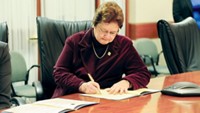Advertisement
Grab your lab coat. Let's get started
Welcome!
Welcome!
Create an account below to get 6 C&EN articles per month, receive newsletters and more - all free.
It seems this is your first time logging in online. Please enter the following information to continue.
As an ACS member you automatically get access to this site. All we need is few more details to create your reading experience.
Not you? Sign in with a different account.
Not you? Sign in with a different account.
ERROR 1
ERROR 1
ERROR 2
ERROR 2
ERROR 2
ERROR 2
ERROR 2
Password and Confirm password must match.
If you have an ACS member number, please enter it here so we can link this account to your membership. (optional)
ERROR 2
ACS values your privacy. By submitting your information, you are gaining access to C&EN and subscribing to our weekly newsletter. We use the information you provide to make your reading experience better, and we will never sell your data to third party members.
Environment
Chemical Society Presidents Pledge Support For Sustainable Development
Six leaders forge global pact at meeting in Paris
by Linda R. Raber
July 16, 2007

The presidents of six leading chemical societies, representing nearly 300,000 members, pledged last week at a meeting in Paris to, in the words of a joint statement, "work together to promote global sustainable development, demand responsible use of resources, and ensure that the next generation of scientists protects and maintains the well-being of Earth and its inhabitants."
The presidents of the American Chemical Society, the Royal Society of Chemistry (RSC), the Chemical Society of Japan, the German Chemical Society (GDCh), the French Chemical Society, and the Dutch Chemical Society developed and signed the statement because "the need to address these intertwined issues is urgent, and chemistry is absolutely essential to the development of solutions," they wrote. They agreed that sustainable development presents scientific, political, social, and economic challenges that are far more complex and urgent than generally conveyed. Unless these challenges are more widely recognized, "we risk being lulled into a false sense of security," they said.
The so-called C6 chemical societies, which are among the largest chemical societies in the world, have been meeting about every two years for the past eight years. They share experiences and challenges and generally develop a few collaborative programs.
This year, the French Chemical Society hosted the meeting in Paris, on July 13???15, prior to a major international scientific meeting commemorating its 150th anniversary.
"Sustainability clearly is the topic that we all felt exceptionally strongly about," said Catherine T. Hunt, ACS president. "Earth's systems, upon which we all depend, are facing complex and imminent threats. Pressures are intensifying on worldwide food, water, and energy supplies. Crucial agricultural and valuable natural ecosystems are under severe strain. If we do not change course toward a more sustainable future, it will have dire consequences for Earth and all its inhabitants."
To address the sustainability challenges, the societies agreed to collaborate with stakeholders in government, academia, industry, and other sectors of the international community to promote education, innovation, and communication, in collaboration with others, as the basis for solving the most important challenge now facing humankind.
Specifically, the society presidents said their societies will "support chemists in developing their skills to ensure the sustainability of our planet; develop a roadmap and priorities for chemistry's contributions to sustainability and advocate for the resources needed to develop and deploy technologies globally; and convene academia, industry, and government to better understand chemistry's contributions to sustainability and the need for action."
According to Dieter Jahn, president of GDCh and BASF's senior vice president, science relations, and innovation management,?? "Chemistry delivers important solutions to the most challenging problems of our planet—supplies of energy and water, improving energy efficiency, climate change, and sustainable development. Because these problems are of a global nature, we need global solutions."
The societies will be following up with a specific agenda in the coming weeks and also inviting other chemical societies to sign the declaration. In addition to Hunt and Jahn, society presidents who signed the statement are Jim Feast, RSC; Peter Folstar, Royal Netherlands Chemical Society; Akira Fujishima, Chemical Society of Japan; and Armand Lattes, French Chemical Society.
In addition to discussing sustainable development, the C6 society presidents, governance representatives, and staff members discussed activities at the boundaries of chemistry with other disciplines, collaboration with other scientific societies, public appreciation of chemistry, interaction with industry, and education. Others attending from ACS were ACS Board Chair Judith L. Benham; ACS Executive Director and CEO Madeleine Jacobs; Director of Membership & Scientific Advancement Denise L. Creech; and Acting Director of the ACS Green Chemistry Institute Tamara Nameroff.




Join the conversation
Contact the reporter
Submit a Letter to the Editor for publication
Engage with us on Twitter